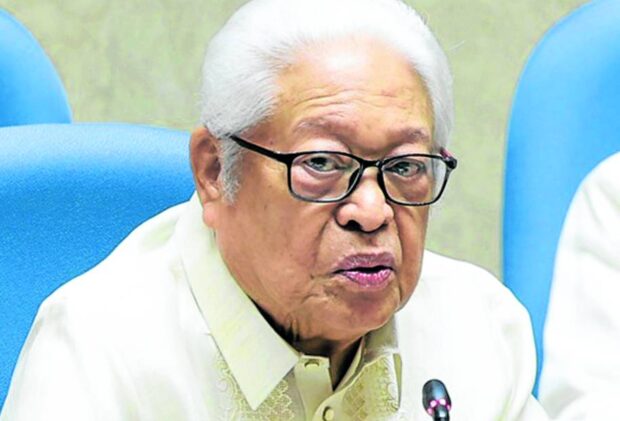Lagman, Gonzales clash over Cha-cha rules

Albay 1st Dist. Rep. Edcel Lagman (PHOTO FROM HOUSE OF REPRESENTATIVES FB PAGE)
MANILA, Philippines — While Albay 1st District Rep. Edcel Lagman has maintained that the House of Representatives and the Senate should convene jointly to amend provisions in the 1987 Constitution, Mandaluyong City Rep. Neptali Gonzales II pointed out that it is merely one interpretation of the rules.
Lagman, at the start of the committee of the whole hearings on Resolution of Both Houses (RBH) No. 7 on Monday, asked if the House of Representatives and the Senate would still convene once both chambers ratify a final version of the resolution.
“Consequently, Mr. Chairman, once this is passed by the House and concurred in by the Senate, the Senate and the House will meet as a constituent assembly to eventually propose the amendments for ratification or rejection by the people in a proper plebiscite. Is that correct?” Lagman asked.
Gonzales, who is the floor leader for the proceedings, responded by saying that it might not be the case because the House and the Senate are already exercising their constitutional mandate of proposing amendments to the Constitution, and would eventually vote separately regarding the ratification of the resolutions.
This means that after both Houses ratify the final version of the House RBH No. 7 and the Senate RBH No. 6, it would be sent to the Commission on Elections (Comelec) which will prepare a plebiscite on the matter.
“That is not exactly the position Mr. Speaker, because our view is that we are exercising separately the powers granted by the Constitution, which is we vote by at least three-fourths of all the members separately and then once we have concurred with the same resolution,” Gonzales said.
“Then it will now be sent to the Comelec for purposes of a plebiscite, and there is no more need to meet as a joint assembly Mr. Speaker,” he added.
But Lagman stressed that there are only three ways allowed to amend the 1987 Constitution — a constituent assembly consisting of lawmakers from the Senate and the House; a constitutional convention elected by the people; and a People’s Initiative which is a direct petition from voters.
In convening as a constituent assembly, Lagman believes all lawmakers from the House and the Senate have to be present in a single convention.
“With respect to the constituent assembly, the representatives and the senators will meet in an assembly because it is a constituent assembly that cannot be acting separately,” Lagman said.
“And only a constituent assembly of representatives and senators can propose amendments to the Constitution for ratification by the people in a proper plebiscite. I would emphasize on that for the consideration of our members,” he added.
But Gonzales countered by saying that the term “jointly assemble” is not found in the 1987 Constitution’s prescribed methods of amending the charter.
“Just to state our position, Mr. Chair, there are two views on the matter; it’s not only the view of the distinguished gentleman which is a sole view. There’s another view that we are — nothing prevents the House from doing it separate from Congress, and that’s exactly what we are doing right now under the Constitution; the words jointly assemble is only found in the 1935 Constitution; there is no mention of the joint assembly in the 1987 Constitution,” Gonzales noted.
“And that’s exactly (why) there’s confusion; there is always the question as to whether we meet jointly or not. Do we vote separately or jointly? That’s the perennial issue. That’s why nothing has happened with our push to amend the Constitution,” he added.
According to Gonzales, the Constitution does not require House and Senate lawmakers to sit jointly — what is asked of lawmakers is to pass amendments by a three-fourths vote of all its members.
“And this time around, the mere fact that under the Constitution it is stated only that Congress may, by a vote of three-fourths of all its members may amend or propose amendments or revision to the Constitution — it was not stated that you have to sit jointly eh, although some believe that there should be a joint assembly,” Gonzales said.
“But that’s one view, and some also say that it is not needed, that we can pass it separately, we vote on it separately na three-fourths vote allowed by the Constitution because the Constitution allowed both Houses of Congress to create our own rules,” he added.
The House earlier started deliberating RBH No. 7, which seeks to amend the 1987 Constitution’s allegedly restrictive economic provisions. In his speech at the opening of the hearing, House Speaker Ferdinand Martin Romualdez has maintained that the mission of the House is clear — to push for economic amendments only and improve the lives of Filipinos.














